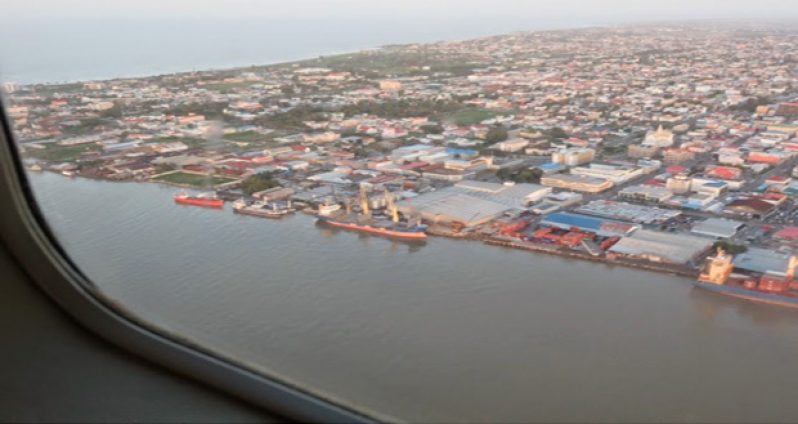CHAIRMAN of the Private Sector Commission (PSC) Mr Norman McLean says the inability of the Georgetown Harbour to accommodate larger vessels is hampering trade and investment in Guyana.
Speaking at a Guyana Manufacturing and Services Association (GMSA) luncheon at the Pegasus Hotel on Monday, McLean said facilities similar to the one at the mouth of the Berbice River are needed in Georgetown.
Oldendorff, a German bauxite company, uses the Berbice Port to move some 40,000 tonnes of bauxite out of the Berbice River.
McLean also noted that the Georgetown Harbour continues to be affected by siltation, pointing out that addressing this problem should be a major priority for Guyana.
He said it is because of the siltation problem that Guyana is paying for dead weight, when 6,000-8,000-tonne vessels leave the Georgetown harbour with much less weight they can carry.
This setback, he said, can be solved through regular drilling, or opening up new channels so as to accommodate larger vessels, as well as larger loading facilities. This, he contended, would remove the hindrance to trade and investment here.
WELL POSITIONED
McLean said Guyana’s being well positioned on the Atlantic Coast gives it a distinct advantage in terms of access to foreign markets.
He also noted that the pool of vocational and advanced skills in Guyana is small, and require huge inputs from both the government and the private sector to increase the availability of trained skills, which would, in turn, enable Guyana to attract huge foreign investments.
The GMSA has direct oversight for the Manufacturing and Services sectors, which encompass value-added food production; value-added wood production; primary and tertiary production of fiberglass, steel and polyurethane products; and mining for gold, diamonds, semi-precious stones, bauxite and some other minerals.
Its membership directory also includes agricultural growers, cattle farmers and manufacturers of pharmaceuticals. On the Services spectrum, it oversees the development of a wide range of industrial and social services including fashion design, music, tourism and the fast-growing Information Communication Technology (ICT) sector. These are all major revenue earners, McLean said.

LUCRATIVE
“In fact, in Guyana and the wider Caribbean, this sector is becoming more and more lucrative. It actually accounts for about 62 per cent of the accumulative revenue generated across the region,” he said, adding:
“In individual Caribbean countries, services trades are now major contributors to our Gross Domestic Products. In response, many of the larger Caribbean countries have already established national coalitions of services industries and Suriname, our neighbour to the east, is now in the process of developing theirs. (It appears that coalitions of every sort seem to be the axis upon which the world is revolving in this millennium).
McLean noted that the Caribbean Export Development Agency (CEDA) has now taken the next step towards consolidating this burgeoning industry.
CEDA has created the Caribbean Network of Services Coalitions (CNSC) and now each country is required to register its body of Services Industries with the CNSC.
McLean said the GMSA is currently in the process of consolidating its national body, and hopes to secure membership in the Caribbean Network before the fourth quarter of this year.
“When we do, Guyana will become eligible for funding and technical support to develop the music industry, specialty healthcare, ICT and a range of other industrial and social services. This funding through Caribbean Export is provided by the European Union,” he said.
He also said that the Private Sector is now more committed than ever to changing the business landscape from reliance on the sale of raw products to promoting new businesses that process rice, fruits and vegetables, meat and milk, wood, bauxite by-products, and the amazing variety of medicinal plants into secondary and tertiary products.
“Our in-country market is small by comparison, so the emphasis has to be placed on sourcing external markets alongside improving procedures at the Guyana Revenue Authority (GRA),” he said as he bemoaned the astronomical energy charges, high customs fees and long, undue delays to process import and export documents.
By Tajeram Mohabir




.png)









